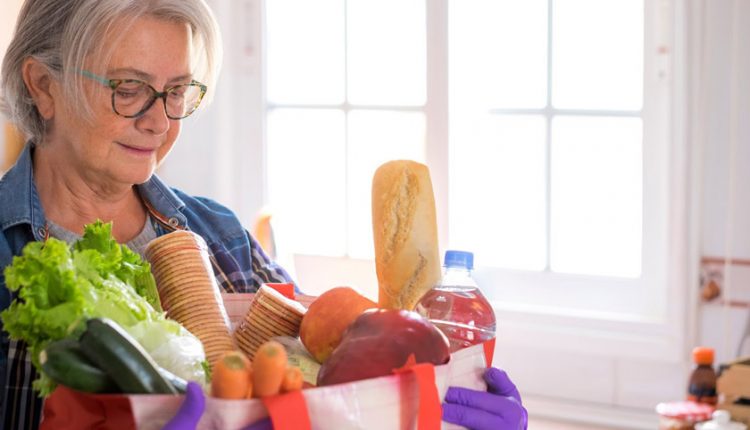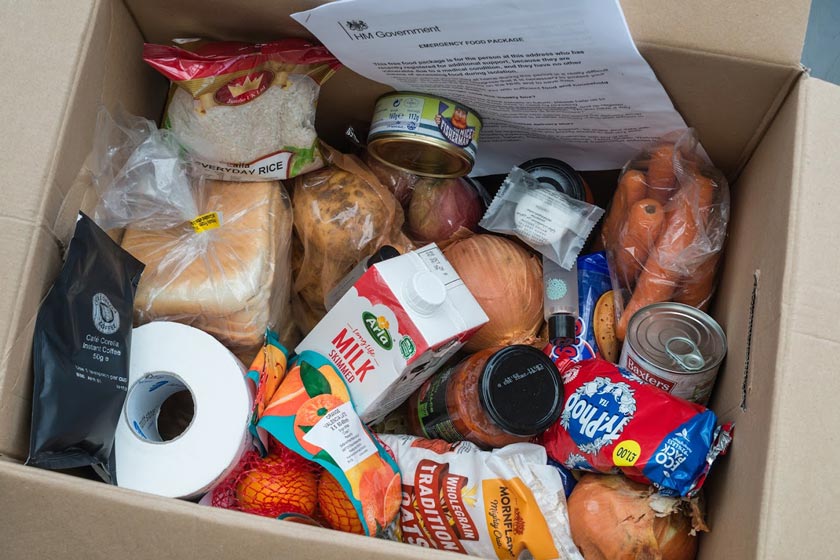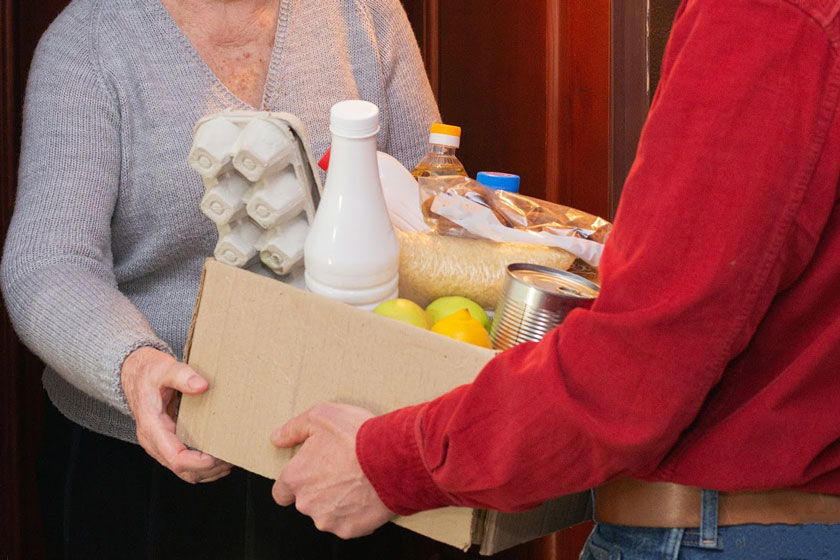
Emergency Food Supply List for Seniors
Humanity has faced numerous disasters in the last century, and during those times, our access to basic life necessities like food, water, power, etc., has been limited. Some disasters like the COVID-19 pandemic affected all of our lifestyles, regardless of age. It will be better to prepare ourselves to deal with such situations by preparing an emergency food and equipment supply list. It is clear that each age range has different requirements, and seniors are not an exception.
Seniors are often more vulnerable to emergencies due to age-related factors such as reduced mobility, health issues, and limited access to transportation. They may also live alone or have limited social networks, making it challenging to obtain necessary supplies during an emergency. The senior nutrition needs and their health conditions are slightly different from other ages. Thus, we gathered some age-based tips you should know before putting together an emergency food supply list for seniors.
A 3-Day Emergency Food Kits for Seniors
Such a food kit should be including non-perishable food and water. Ideal items are the ones that don’t need refrigeration, minimal or no preparation or cooking, and in a word, shelf-stable foods. It is also essential that the items be as lightweight and easy to handle as much as possible.
Of course, the following items must be personalized, but some essential things are expected.
- Ready-to-eat or canned foods, soups, vegetables, fruits, etc. (low-sugar, salt, and fat contents).
- Foods with high calories like jelly, crackers, whole grain bread, granola bar, and trail mix.
- Water ( 8 litres or 1 gallon per day per person for drinking, cooking, and hygiene).
- Vitamins
- Medicines*
* This group is not food, but the necessity and keeping conditions are the same as foods.
A Long-Term Emergency Food Supply for Seniors
When a disaster strike, we have to stay at home for more than two weeks, so putting together the right emergency food plays a vital role in senior health. These foods should meet the nutritional requirements of seniors and be shelf-stable enough to stay safe. Besides, foods must be compatible with their diet restrictions for a long-term period, e.g., low fat, low sugar, and salt, high fibre content. With this in mind, some foods you can consider adding to the emergency food supply are:
Lean Proteins (Eggs, Beans, Lean Meat, Textured Vegetable Protein).
No matter how old you are, we have to eat proteins to keep up our muscle mass, and so do seniors.
Canned fish (especially those containing soft bones),
canned chicken, turkey, etc., freeze-dried meats for the long run.
Eggs are another popular protein source among seniors that includes almost all essential proteins for keeping healthy. However, you can’t store this item freshly for a long time; instead, you can use freeze-dried eggs with a complete protein profile and long shelf stability. Beans are the third group of lean meats classified as a rich source of protein and dietary fibres. Beans are one of the most affordable protein resources in this group; on the other hand, beans have additional health benefits for seniors due to their fibre contents.

Textured vegetable proteins (TVP), i.e., soy-based protein, have texture and taste like meat. These proteins are shelf-stable, almost have no fat, and are reasonably low in price. These properties make TVP a good candidate for long-term emergency food supply for seniors.
Vegetables and Fruits
The importance of vegetables and fruits in seniors’ long-term emergency food list is their vitamins and minerals necessary for our body and mind’s excellent function. Homemade canned vegetables and fruits in the water with almost no adding sugar would be appropriate for long-term storage for around 1 or 2 years. If you plan to put together an emergency food kit for seniors, you can consider freeze-dried fruits and vegetables. Like beans, this group contains a high amount of dietary fibre that is useful for seniors’ gastrointestinal health.
Whole Grains (Quinoa, Oat)
Whole grains are an excellent source of dietary fibre, vitamins (especially B groups), and minerals. However, although almost all grains look sturdy and rigid, like wheat or rice, they are susceptible to mould growth due to their moisture and temperature sensitivity.
All these reasons lead to limiting their storage time. Fortunately, there are still some options you can store for the long run by using some treatments. Quinoa and oat are whole grains that are shelf-stable for years if you keep them in a mylar bag containing oxygen absorbance materials. By doing so, you can benefit from this valuable food even if you unpacked them after several years.
Low-Fat Milk (Or Alternatives)

Everyone knows that milk and milk products are reasonably necessary for human health. These products are a perfect source of calcium and somewhat vitamin D (both needed for our bone and teeth strength, proper muscle function, etc.). There is commercially available fresh milk you can store for six months at ambient temperature (sterilized milk). Nonetheless, suppose you are willing to keep milk for more than six months. You can consider powdered milk which is also commercially available in different brands in the market.
Other milk products, especially the fermented ones like cheese and yogurt, have high nutritional value and are shelf-stable enough to be categorized in the emergency food lists for seniors. Hard cheese like cheddar or parmesan has low moisture and low-fat content, so you can successfully store them for months. (it’s better to keep them in the sealed pack and refrigerator or cold temperature). If you plan to keep the cheese for more than several months, freeze-dried cheese would be a perfect option, provided that it uses impervious packaging. Powdered yogurt, i.e., freeze-dried yogurt, is another milk product you will keep for up to two years if you store it properly.
Vitamins (And Medicine)
As mentioned earlier, regular foods contain our needed vitamins. However, seniors can not properly absorb enough vitamins from food for various reasons, and eventually, we see vitamin deficiency in seniors. Still, their body requirement is higher than the amounts in the food. Since vitamins are essential to mental and physical health, having access to these nutrients will help get stuck at home. So, consider Vitamins on the emergency food list for seniors.
water
Having access to safe drinking water is quite important in an emergency food supply for seniors. The required amount of water per person per day is 3.8 litres for drinking, cooking, and hygiene.
Final words
Being prepared for situations where we have to stay at home, like a disaster or a global pandemic, will help us better cope with the situation. A precisely prepared emergency food list for seniors will come in handy and guarantee their physical and mental health during those periods and improves the mental health of the elderly during COVID-19.
I would like to have a pdf printable list of emergency foods for my parents.
Jelly doesn’t seem like a good choice as an emergency supplement to consume for who knows how long, especially for seniors. It’s full of sugar. Using too much of it can even lead to heart diseases. Another thing jellies may cause is cavities which would be really hard to attend to during a lockdown or a disastrous event. So I think seniors should avoid using it and younger people should only use it in moderation.
There are some sugar-free jellies they can have. They are healthier and acceptable to be on this list.
The thing is, I am a vegan, and many people are like me. So eating meat, eggs, canned fish or canned chicken and many other supplements mentioned in this article is difficult for us. For some of us, it’s even out of the question. Do you think vegans should abandon their diets in emergencies, or are there proper alternatives we can provide in case of an emergency?
No it doesn’t depend on being vegan or not. I recently started researching storing white rice and dried black beans and was unhappy with the information I found.
Some sources claim that rice can be preserved airtight in a cold, dry environment for 15 years or more, while others claim just five years. I intend to buy the packages of white rice and dry black beans from Walmart as they were the cheapest I could find locally in Toronto, Canada.
It is once in a lifetime. how many times are you in a disaster? One Jelly doesn’t kill anyone…. :)))
Yes, you’re right, if it’s once in a lifetime, it won’t kill anyone, but easier said than done. Usually, people say such things to get rid of the guilty conscience of delicious foods they know they shouldn’t have had. So dear Cherry, take it seriously if you care about your health.
What about seniors with diabetes? My grandfather has diabetes and sometimes he experiences low blood glucose. Besides he can not have eggs, because of his heart condition.
Hi, El. Here is some stuff that is totally fine for people with diabetes, without taking other conditions they might have into account. Black beans and brown rice have high amounts of protein and fibre. Specialty foods that are diabetic friendly are great options for those times that a diabetic person might crave something to eat but doesn’t want to go through the complete process of making it. Oats and oatmeal are good choices as well since many people with Type 2 diabetes can’t have wheat. You can also store blueberries that are freeze-dried and dehydrated. They have soluble fibre and anthocyanins, which help with insulin resistance and keep the heart healthy.
I’m a little worried about my weight; Although I’m not sure If I’m overweight. Most of these supplys seem to be high calorie foods.
Oh God it is about a disaster Food list , you can keep your diet and count calories when you are not in danger….
Once in a month, my daughter, hazel, brings food supplies similar to the mentioned list here. However, we have never thought of preparing any medicine! I should show her this article. Thanks
As long as you have a water source, rice and pasta are an excellent start. Even Ramen noodles can be good.
Add some canned fruit, spaghetti, and ravioli; you have a decent start. Don’t be overly concerned about meats.
Yes, you do need proteins; but your motor keeps running on carbs.
Generally, anything that does not need refrigeration to last a few months is already a good candidate. Pack and store multiple, with backups and rotation.
This article is so useful and true. I remember we supplied my grandma with an emergency food supply right before Covid 19, and it was so useful for her because she didn’t have to worry about her supplies for a month.
Your comment reminds me of my mom. My mother always had lots of food in her house. She had many canned foods, snacks, rice, noodles, and meats in a giant freezer. No matter how threatening things get, we always had food. As a 65 years old man, I believe water is the most important thing we need to check on our list. As we get older, we ought to drink more water. While we can go for days or weeks without food, we can go without water for only days.
I know how important it is to store foods in an emergency, but I can not do that because it stresses me out when I even think about it. As if my mind wants to ignore the possibility. I live alone, and I’m scared to death when my friends warn me about storing food. What can I do to overcome this anxiety?
Thanks for the time and effort you’ve spent on this article. But there is a problem with providing the emergency food supply list! Well, it is true that we certainly need emergency foods in case of emergency. But the fact is, as a retired person, I have to buy my groceries daily to reduce the leftovers and also expenses as much as possible. The prices are getting higher and higher every year! So it’s nearly impossible to spend so much money buying supplements for two weeks! So it doesn’t seem logical for me to do that!
As for kits, I say start with a car kit (if you have a car) since it is usually close to where you are every day. If you do not have one, I will start thinking about what small items would be advantageous to carry every day.
Since I’ve accomplished that myself, I have started buying extra food. I began by buying extra shelf-stable foods (canned and boxed foods we like, dried fruit, soy milk, peanut butter, canned meats, lard, etc.) and asking for samples of “emergency meals” from different companies to get an idea of how I liked them.